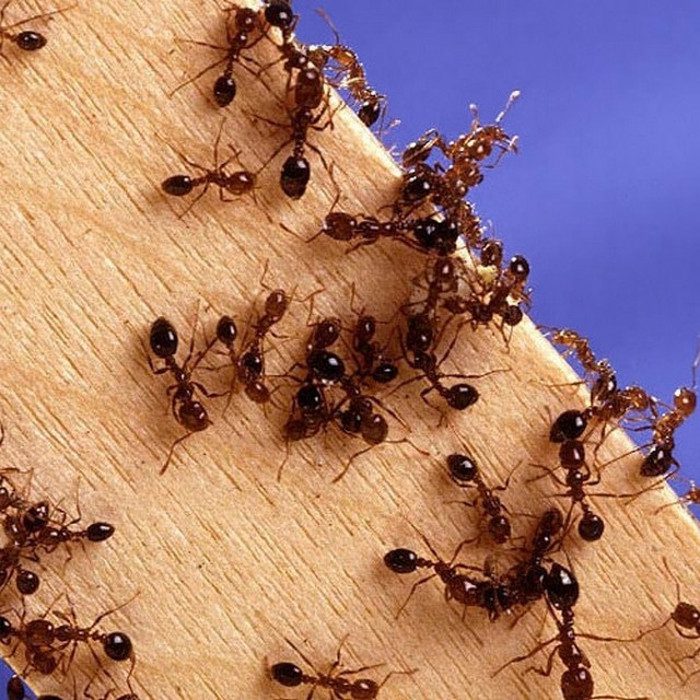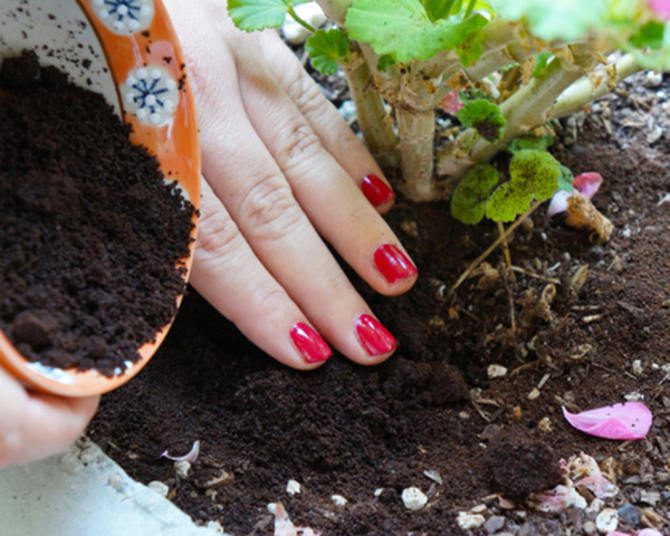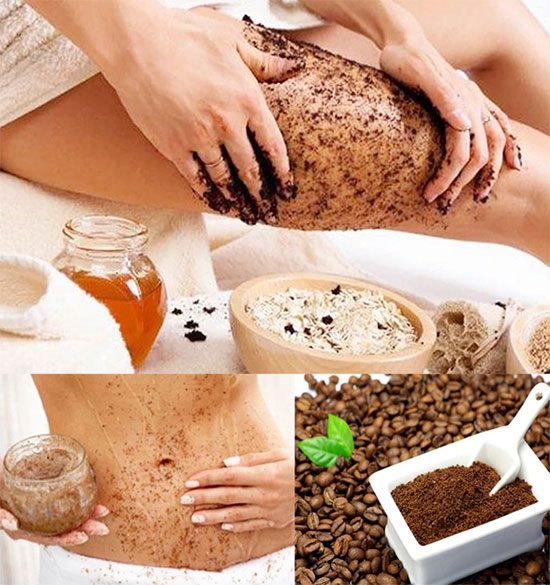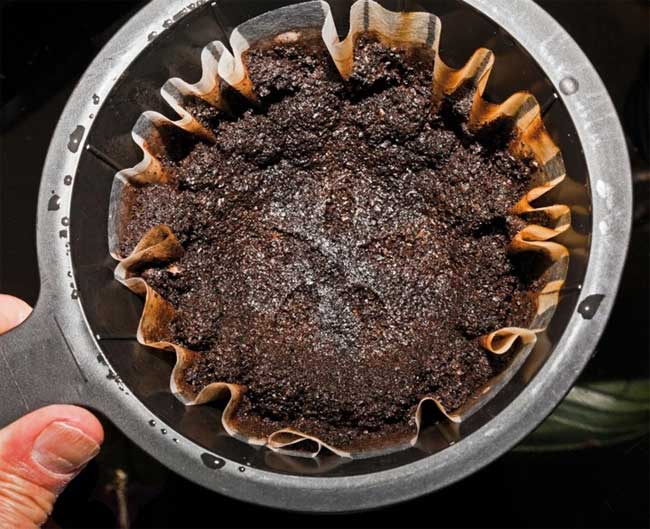Many people are aware that coffee grounds serve as excellent fertilizer due to their nitrogen enrichment properties for the soil. However, few realize that coffee grounds have numerous other beneficial uses, such as deodorizing, repelling ants, and smoothing hair…
Surprising Uses of Coffee Grounds
Repelling Cats
Sprinkle a mixture of coffee grounds and orange peels around your garden or potted plants to deter cats from digging them up. This not only benefits the soil and protects the plants but also keeps the cats safe, as many garden plants can be harmful to them.

Coffee grounds are very useful in our lives. (Image: WordPress).
Deodorizing
Coffee can absorb odors from its surroundings, making it a very effective natural deodorizer. To deodorize your refrigerator, dry the coffee grounds and place them in a cup inside. If you want to eliminate the lingering smells of garlic, onion, or other strong-smelling foods on your hands, simply rub coffee grounds over them, and the unpleasant odor will disappear.
Similarly, you can use coffee grounds to deodorize your bathroom or old food containers. If you want to remove body odor, wrap coffee grounds in a cloth bag and rub it all over your body while showering…
After a long day at work, your shoes and feet may have an unpleasant odor, making you hesitant to wear them again tomorrow. Place some coffee grounds in the shoes you wore to eliminate bad smells. To combat foot odor, you can wash your feet with water mixed with coffee grounds daily. You can also use coffee grounds to scrub away underarm odor.
Deodorizing the Refrigerator: Coffee grounds act as an odor absorber. Place a small bowl of coffee grounds in the refrigerator overnight, and the unpleasant smells will vanish, helping preserve your food better. Repeat this process every few weeks for optimal results. You can also keep coffee grounds in the fridge for several days to neutralize the fishy smell of meat and seafood…
Additionally, if your hands pick up food smells like fish or garlic while cooking, rub them with a handful of coffee grounds, then wash with soap.
Exfoliating
This might sound silly, but it is indeed an effective idea. The caffeine in coffee grounds increases blood flow, making it effective for treating rough skin areas caused by fat accumulation or stretch marks due to poor skin elasticity, as well as minimizing pores… Hence, in addition to keeping you alert, this substance can also invigorate your skin.
So, mix coffee grounds with olive oil or simply scrub coffee grounds on your face, relax for 30 minutes, and then rinse clean. For oily skin, you can add yogurt before applying it to your face. With summer here, you can mix coffee grounds with facial wash. Wash your face first, then apply sunscreen before heading outside for smooth, non-tanned skin.
 Ants dislike the scent and properties of coffee.
Ants dislike the scent and properties of coffee.
Repelling Ants
If you are frustrated with ants and cannot seem to get rid of them, try sprinkling coffee grounds at the entrances they often use, like doorways. The nitrogen in coffee grounds will burn the ants’ feet, so they will avoid crossing this “ant-repellent” barrier. If you’re feeling more aggressive, you can pour coffee grounds directly into the ant nest, and they will no longer disturb you.
Grooming Pets
Mix coffee grounds with a little water, and you have a fantastic solution for pampering your pets. Apply this mixture to your pet’s fur; it will soften the hair and enhance its color. Moreover, many believe that coffee grounds can eliminate fleas and other parasites.
Cleaning Bottles
For narrow-mouthed bottles that you cannot reach to clean, add some coffee grounds inside and rinse with cold water.
 Coffee grounds enrich the soil, making it more acidic
Coffee grounds enrich the soil, making it more acidic
Fertilizer
Coffee grounds are highly favored by gardeners because they make excellent fertilizer. When mixed with the soil’s nutrients, coffee grounds enrich the soil, making it more acidic. Plants thrive in acidic soil as they can absorb more nutrients. If you have a supply of coffee grounds, save them to keep your garden blooming year-round.
If you want a bountiful carrot and radish harvest, mix their seeds with dried coffee grounds before planting this mixture as usual, and await a high-yield harvest.
Shiny Hair
Coffee grounds can also be used for hair care to make it shiny. Rub coffee grounds into wet hair and massage evenly for a few minutes, then rinse with water. To avoid clogging the drain, you can catch the rinse water in a basin and use it to water your plants: a two-in-one solution!
Dyeing
If you pour hot water over coffee grounds, you create a brown dye for fabrics, artwork, or other applications.
Coffee Grounds for Dark Circles
If you suffer from dark circles under your eyes and don’t want to spend a fortune on cosmetics, coffee grounds are an ideal choice for you. This is because coffee grounds contain a high amount of caffeine – a substance that is very effective in stimulating blood circulation and reducing inflammation. Regular use significantly diminishes dark circles and swollen eyelids.
Coffee Grounds for Skin Whitening
In addition to its exfoliating properties, the nutrients, vitamins, and minerals in coffee grounds nourish healthy skin, stimulate new cell production, and effectively improve pigmentation, making dull, lifeless skin quickly radiant. Therefore, you can use coffee grounds to help you achieve the beautiful skin you desire.

The nutrients, vitamins, and minerals in coffee grounds nourish healthy skin.
Creating Biodegradable Plastics
We have heard much about environmentally friendly biodegradable plastics made from nanocellulose. While these fibers are typically derived from wood scraps, a study by Japanese scientists shows that we can also obtain these fibers from coffee grounds. And the good news is that this raw material is abundant.
Currently, there is no accurate statistic on the supply of coffee grounds. However, the International Coffee Organization estimates that over 6 million tons of coffee grounds are discarded worldwide each year. Some of these grounds are composted, while others are used in materials capable of capturing carbon, biofuels, or road construction materials. Nevertheless, this is just a small portion, and most coffee grounds are often wasted.
This waste has raised questions among many scientists, including Izuru Kawamura, a professor at Yokohama National University in Japan. He decided to investigate whether this coffee “waste” could be used as a source of nanocellulose fibers. The result showed that coffee grounds have tremendous potential for harvesting nanocellulose fibers. Specifically, about half of their weight and volume can be used to create nanocellulose fibers.
Researchers employed a process called catalytic oxidation, where a catalyst is used to oxidize the cells in the ground coffee beans.

Over 6 million tons of coffee grounds are discarded worldwide each year.
After obtaining cellulose nanofibers from coffee grounds, scientists continued their analysis and discovered a uniform structure. These fibers integrate very well with polyvinyl alcohol (CH2CHOH), a water-soluble synthetic polymer derived from the polymerization of vinyl alcohol. This type of polymer is commonly used in the production of biodegradable plastics.
From this, the research team came up with the idea of using coffee grounds to create biodegradable plastic.
Kawamura stated: “Nowadays, more and more restaurants and coffee shops have banned the use of single-use straws. Following this trend, we aim to create a coffee cup and straw made from various additives, including cellulose nanofibers derived from used coffee grounds.”
Effective Removal of Bentazone (Herbicide)
According to a publication in the scientific journal Journal of Chemical Technology and Biotechnology, when using zinc chloride to activate carbon from coffee grounds, this carbon can eliminate bentazone by up to 70%.
Bentazone is the most commonly used herbicide in agricultural activities worldwide. In our country, it is often referred to as clearing herbicide/chemical.
While it helps to eradicate weeds, bentazone poses a risk of toxicity to certain plants and animals in the area. The U.S. Environmental Protection Agency (EPA) has warned that this herbicide can be harmful if it contaminates groundwater and drinking water sources.
Previous studies have shown that bentazone can adversely affect human health through respiratory, digestive routes, or skin absorption.
Scientists from UTFPR conducted experiments on onions growing in soil contaminated with water containing bentazone.
Initial observations indicated that this contamination caused significant cellular toxicity to the root meristem tissue of onions.
However, when treating contaminated water with a type of activated carbon made from coffee grounds, the toxins were significantly removed, allowing the onion tissues to grow normally, similar to onions watered with clean water.


















































